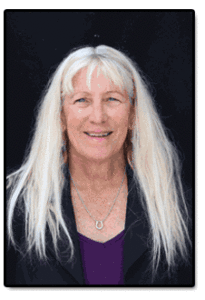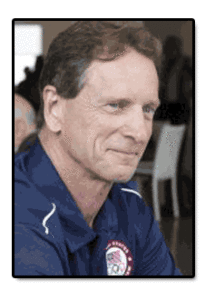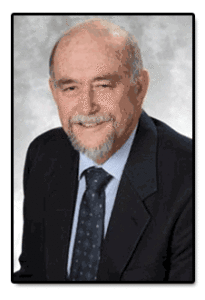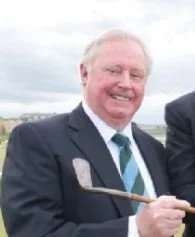History
The World Scientific Congress of Golf began as an idea in St Andrews, Scotland in 1987. John Scott, a member of the faculty administering the University of St Andrews Physical Education degree, looked for published research on golf science to give students ideas for their final year projects. He found a lot of articles about the history of golf but very few about the science of golf. He approach the head of the PE program, Martin Farrally, with the idea of putting on a conference about Science and Golf. Martin spoke with the R&A about supporting such an event and was put in touch with the technical director, Alastair Cochran. They were able to acquire the funding necessary and, in 1990, hosted the first “Science and Golf” conference the week before the Open Championship, with around 300 attendees and speakers from all over the world.
With momentum behind them from a successful conference, Alastair Cochran and Martin Farrally, joined by Frank Thomas (technical director of the USGA) established the World Scientific Congress of Golf Trust to bring together researchers, professionals, and interested golfers in the areas of the Golfer, the Golf Course, and Equipment and Technology. The goal of the meetings was and remains to present the latest research on these areas to a wide range of researchers, industry representatives and golfers. Conferences were held every four years in St. Andrews, Scotland (1990, 1994, 1998, 2002) with interim (smaller) conferences held in Japan (1992), Ireland (1996) and the USA (2001). Alastair and Martin have kindly donated all records of the organization of the conferences from 1990 to 2002 to the University of St Andrews Library where they are kept in the archives. They are available to anyone in future wanting to access them.
In the mid 2000s the Trust in St Andrews was starting to wind down and Debbie Crews took the organization to Arizona, USA and created a new LLC with the name “World Scientific Congress of Golf”. Many of the board members in St Andrews assisted in this transition to its new home. Debbie remained chairman of the board for close to 15 years and oversaw further conferences in the USA (2008, 2012), Australia (2014), St Andrews (2016) and Canada (2018). In the summer of 2018, Debbie decided to step down and asked a few new members to join the board.
The current board took over the responsibility for the organization just before the 2018 conference and created a new not-for-profit organization called “Golf Science”. The 10th WSCG was held in 2022 in Sioux Falls, South Dakota, USA. WSCG XI was held in Loughborough, UK in July 2024. We are currently looking for potential hosts for the 12th WSCG in 2026 or 2027.
Former Board Members
-

Martin Toms, PhD
Dr. Martin Toms is the former Editor of the Journal and was a member of the Golf Science board from 2012 to 2024. Martin is a senior lecturer in sports coaching at the University of Birmingham in the UK. He is heavily involved in golf education and set up and manages the joint University and PGA (of GB&I) programme in Applied Golf Management. He has also been involved in golf education at an International and European level. He was involved in the inaugural Golf Monthly top 25 UK coaches in 2004, and since then has been involved in research and conference presentations around developing elite coaches and performers, youth performance and talent development. He has published in many academic and professional spheres and is currently involved in a Pan-European project investigating occupational standards in golf. He holds BA(Hons) and MPhil degrees in sport, and also a PhD (participant development and coaching) from Loughborough University.
-

Kerrie Evans, PhD
Dr. Kerrie Evans was the Chair of Golf Science from 2018 to 2021 and a member of the board from 2014 to 2022. Kerrie is a Senior Research Fellow in the Faculty of Health Sciences at the University of Sydney in Australia, a Specialist Musculoskeletal Physiotherapist and a Fellow of the Australian College of Physiotherapists. Kerrie’s research has focused on low back pain in golfers and her research continues to explore the assessment and management of spinal pain in both athletic and non-athletic populations, the benefits of exercise for golfers, movement variability, and mechanisms underpinning the effectiveness of manual therapy. She consults for various golfing bodies including the Australian PGA, the Australian PGA-International Golf Institute and the Ladies European Tour and writes articles about golf for various websites, magazines and scientific journals. Kerrie’s research always has a clinical focus.
-

Debbie Crews Ketterling, PhD
Dr Debbie Crews Ketterling was the Chair of Golf Science from 2006 to 2018 and previously was a member of the board from 1995 to 2006. Debbie is a Sport Psychology Consultant for the Arizona State University Men’s and Women’s Golf Team and a Research Analyst with Kinesiology at Arizona State University. She is also a Class A LPGA Teaching and Club Professional & member and has been an LPGA National Education Program Instructor since 1997. Over the past 25+ years her research has been published in numerous scientific journals and also in popular golf magazines (Golf Magazine, Golf Digest). Crews received her BS degree from the University of Wisconsin – Madison in 1974 and her MS and PhD from ASU in 1980 and 1989.
-

Robert (Bob) Christina, PhD
Dr Bob Christina was a board member from 2006 until early 2018. Bob is dean emeritus of the School of Health and Human Performance at UNCG, a nationally renowned author on the psychology of golf learning and performance and an assistant coach for the men’s golf team at the UNCG. He currently serves as a research and educational consultant to the Pinehurst Golf Academy, PGA of America, Golf Magazine and its Top 100 Teachers and Precision Golf School of the Triad. In 2009, his research with Eric Alpenfels, director of the Pinehurst Golf Academy, on how to practice golf skills to learn to effectively take them to golf course won The Outstanding Research Award at the World Scientific Congress of Golf. He holds a bachelor’s from Ithaca College and a master’s and PhD from the University of Maryland.
-

Phil Cheetham, PhD
Dr Phil Cheetham was a member of the board from 2012 until 2018. Phil is the Director of Sports Technology for the US Olympic Committee at the Olympic Training Center in Chula Vista, California. He works with a range of sports including track & field, golf, trampoline and swimming. Since 2004, Phil has been a co-owner of Advanced Motion Measurement, Inc. and Director of the TPI Biomechanics Advisory Board. Phil’s golf research includes seminal work on the X-Factor Stretch in 2000. In 2008, he co-authored a study of the Kinematic Sequence published in “Science and Golf V”. His PhD dissertation is “The Relationship of Club Handle Twist Velocity to Selected Biomechanical Characteristics of the Golf Drive”. Phil is an Olympian in Gymnastics, for Australia. Phil received a BEng degree from the University of New South Wales, Sydney, Australia in 1977, a MS in Physical Education from Arizona State University in 1981 and a PhD in Exercise Science (Biomechanics) in 2014, also at ASU.
-

Patrick Thomas, PhD
Dr Patrick Thomas was a member of the board from 1995 until 2016. Patrick was Associate Professor, School of Education and Professional Studies at Griffith University in Brisbane, Australia. Thomas taught psychology and research methods in the Faculty of Education for more than 25 years. He is a founding member of the College of Sport Psychologists of the Australian Psychology Society. Thomas completed a teaching certificate and then went on to study at the University of Queensland, graduating fist-class with honors and a university medal in psychology. He subsequently completed research MS and PhD degrees in organizational and cognitive psychology.
-

Rufer Lutz, PhD
Dr Rafer Lutz was a member of the board from 2006 to 2012. Rafer was an Associate Professor, Health, Human Performance & Recreation at Baylor University. His primary area of research was directed to understand human motivation for physical activity and sport. Specifically his interests were related to understanding how personal goals, stress, and personality interact to facilitate/thwart progress on physical activity. Lutz received his BA in psychology from the University of Washington, in 1993. He received his MS and PhD at Arizona State University in Exercise Science (Sport & Exercise Psychology Emphasis) in 1997 and 2001.
The Rafer Lutz memorial lecture was created and delivered at each World Scientific Congress of Golf from 2012 to 2022 in his memory. Since 2024 the lecture has broadened to a Golf Science Fellows memorial lecture.
-

Chris Como
Chris Como was a member of the board from 2018 to 2022. Chris has dedicated his life to coaching golfers of all levels. In order to learn the most effective coaching practices in the game, Chris spent the first part of his career either working for or studying with many of the preeminent teachers of the game. With his vast real-world teaching experience, Chris teamed up with Bio-mechanics professor Dr. Young-Hoo Kwon to advance golf performance from a unique perspective while obtaining his own Master of Science degree in Bio-mechanics. Chris has done workshops or certifications with Nike Golf 360, TPI, the CHEK Institute and ELDOA. He has an eclectic background of resources that he brings to his instructional philosophy. He has worked with players from the PGA, LPGA and Champions Tour and is a member of both Golf Magazine’s “Top 100 Teachers in America” and Golf Digest’s “Top 50 teachers in America”.
Founding Members
-

Alastair Cochran, PhD
Dr Alastair Cochran was a founder-member of the World Scientific Congress of Golf. He was the technical director at the R&A and alongside Martin drove the vision for the WSCG during the 1990s and early 2000s.
-

John Scott
John Scott was a lecturer on the St Andrews University Physical Education degree course and had the original idea for a conference on Science and Golf. He was instrumental in arranging the first conference and starting to shape what would become the World Scientific Congress of Golf.
-

Frank Thomas
Frank Thomas was instrumental in growing the World Scientific Congress of Golf in the 1990s. He was the technical director at the USGA and served as a key link between the WSCG and the USGA. Frank continued to support the WSCG after it moved to Arizona in the mid 2000s and spoke as recently as the 2012 conference.
-

Martin Farrally, PhD
Dr Martin Farrally was the head of the St Andrews University Physical Education degree course and a founder member of the World Scientific Congress of Golf. Martin was instrumental in organizing the first conference and creating the WSCG Trust in St Andrews, playing a huge role in the second and third major conferences in 1994 and 1998. He remained involved until the WSCG moved to Arizona in the mid 2000s.
-

Eric Wallace, PhD
Dr Eric Wallace was involved from the early days of the World Scientific Congress of Golf, hosting an interim conference in 1996 and joining the board to during the late 1990s and into the 2000s, remaining involved during the first few years of the organization moving to Arizona.
-

Eric Thain, PhD
Dr Eric Thain ran the WSCG Trust in St Andrews from 1999 until the organization moved to Arizona in the mid 2000s.
The members above created and grew the original “Science and Golf” conference into the “World Scientific Congress of Golf” trust in St Andrews during the period from 1988 to 2002.
Other members of the board of the Trust at one time or another were Peter Dawson from the R&A, David Fay from the USGA, Struther Arnott from the University of St Andrews and the local St Andrews lawyer James Murray.

